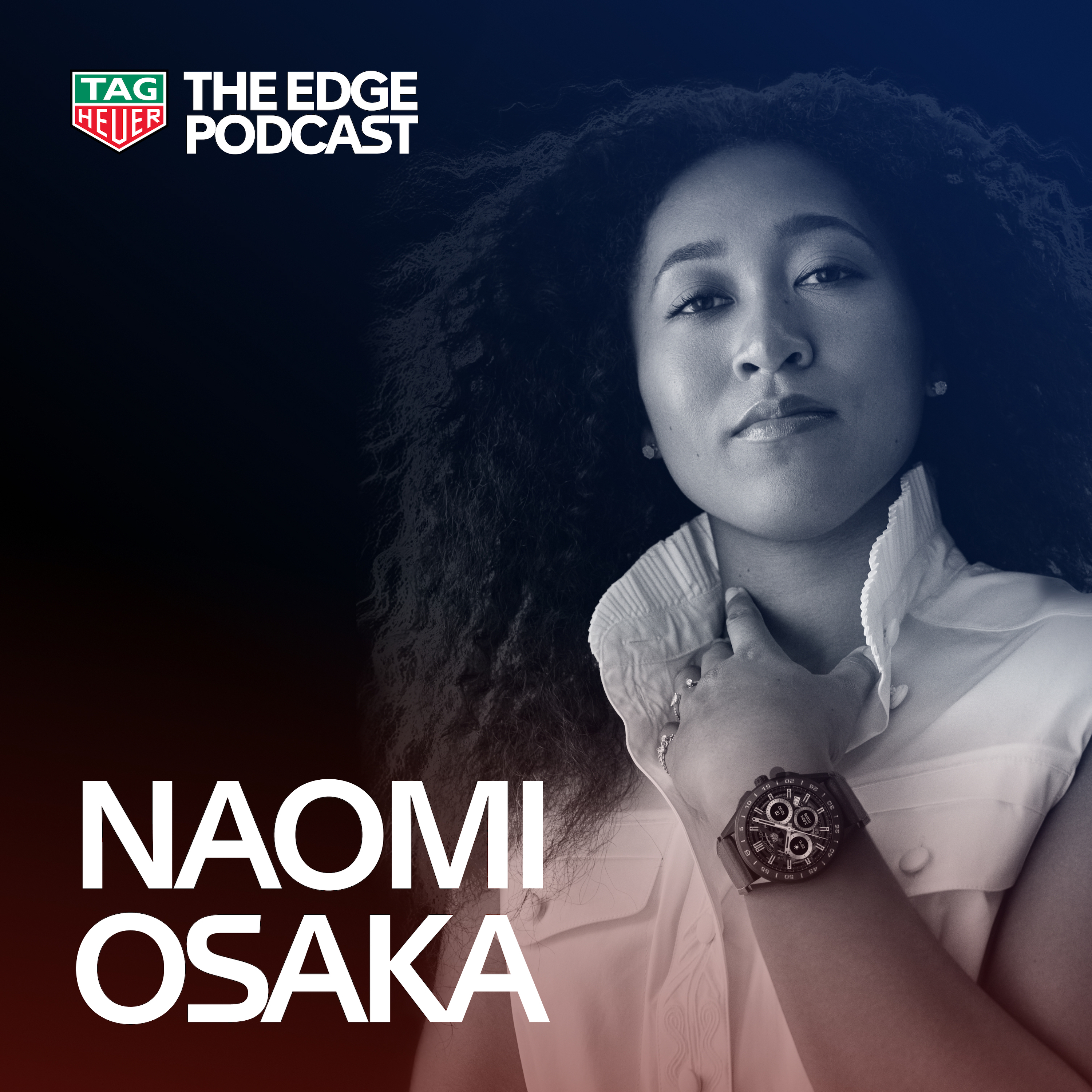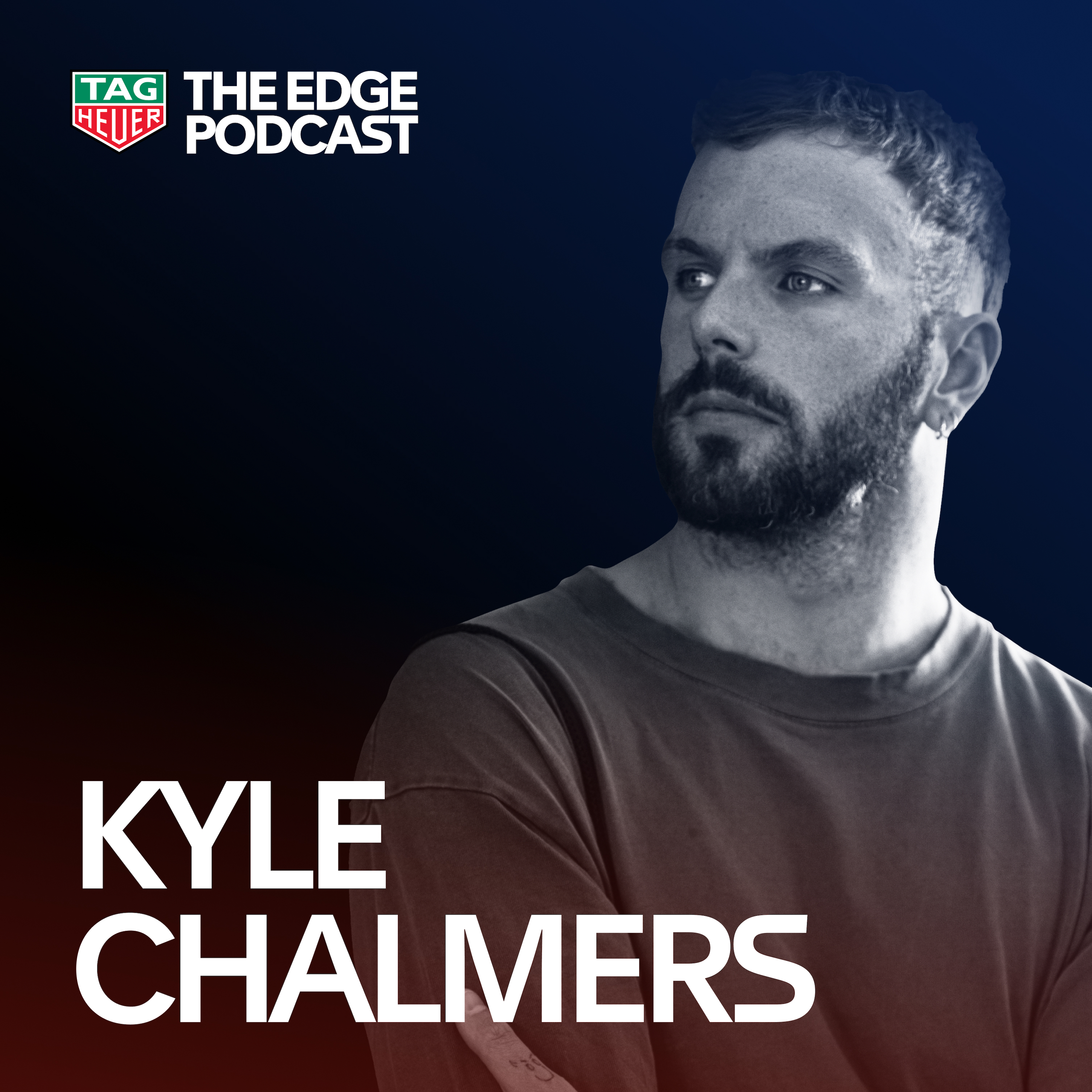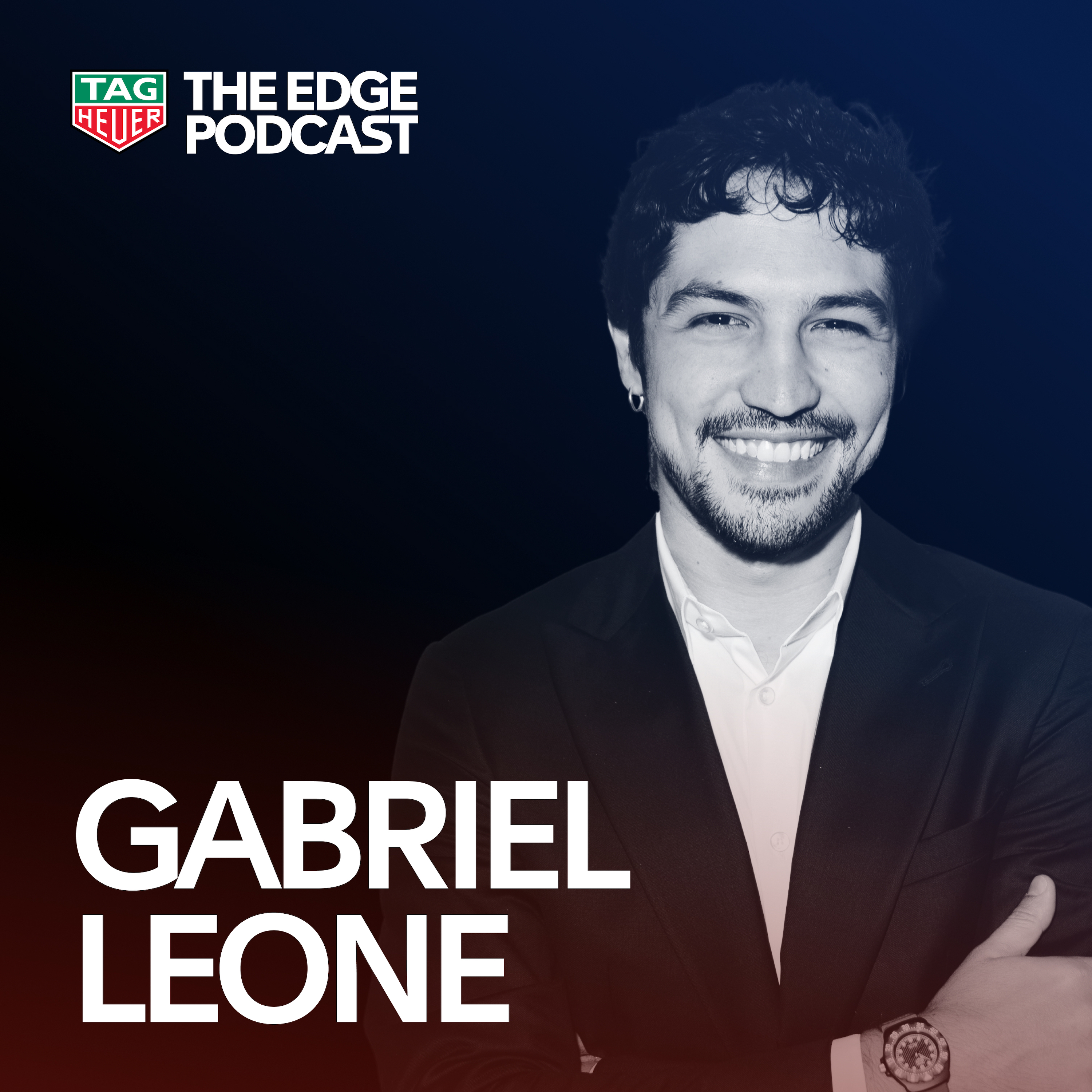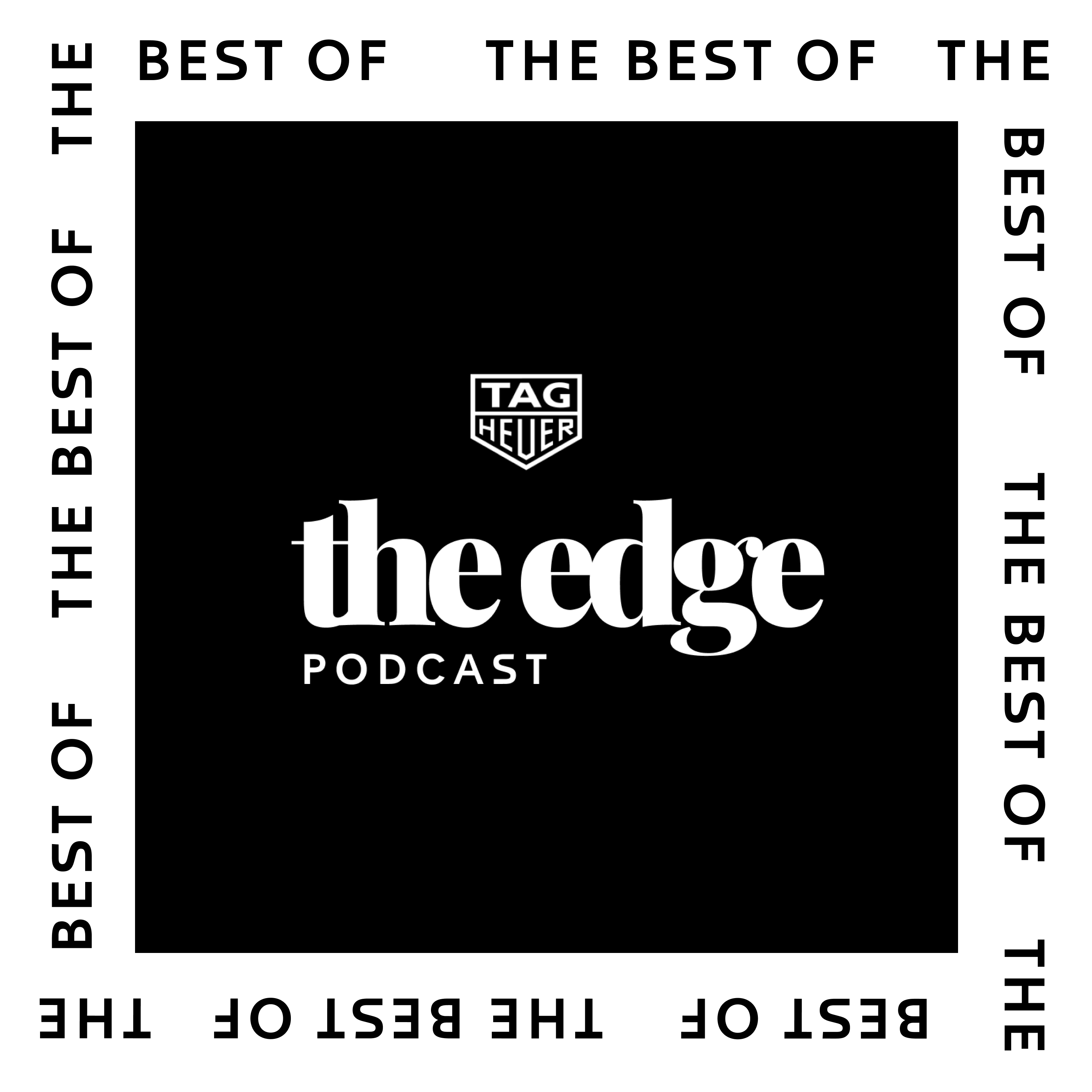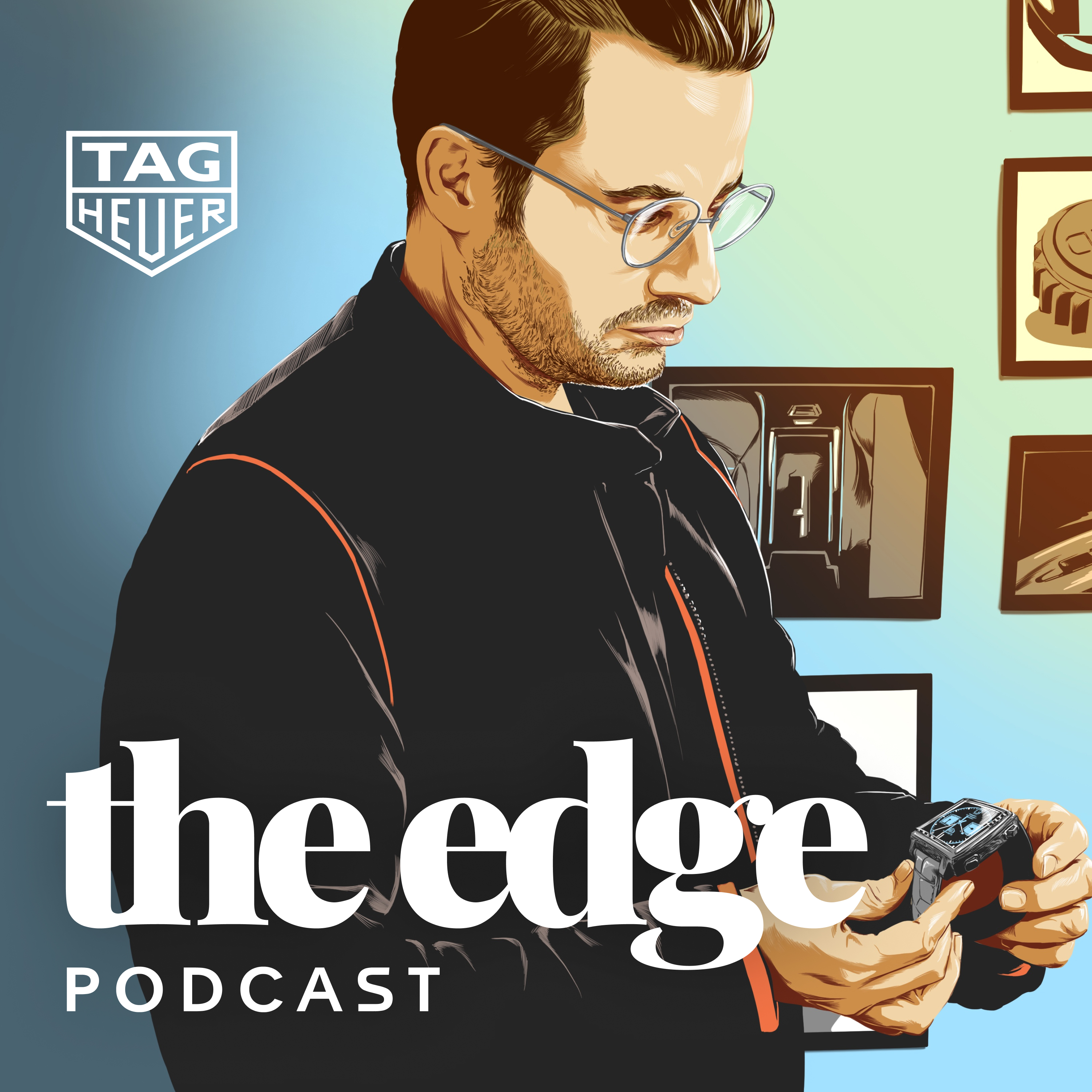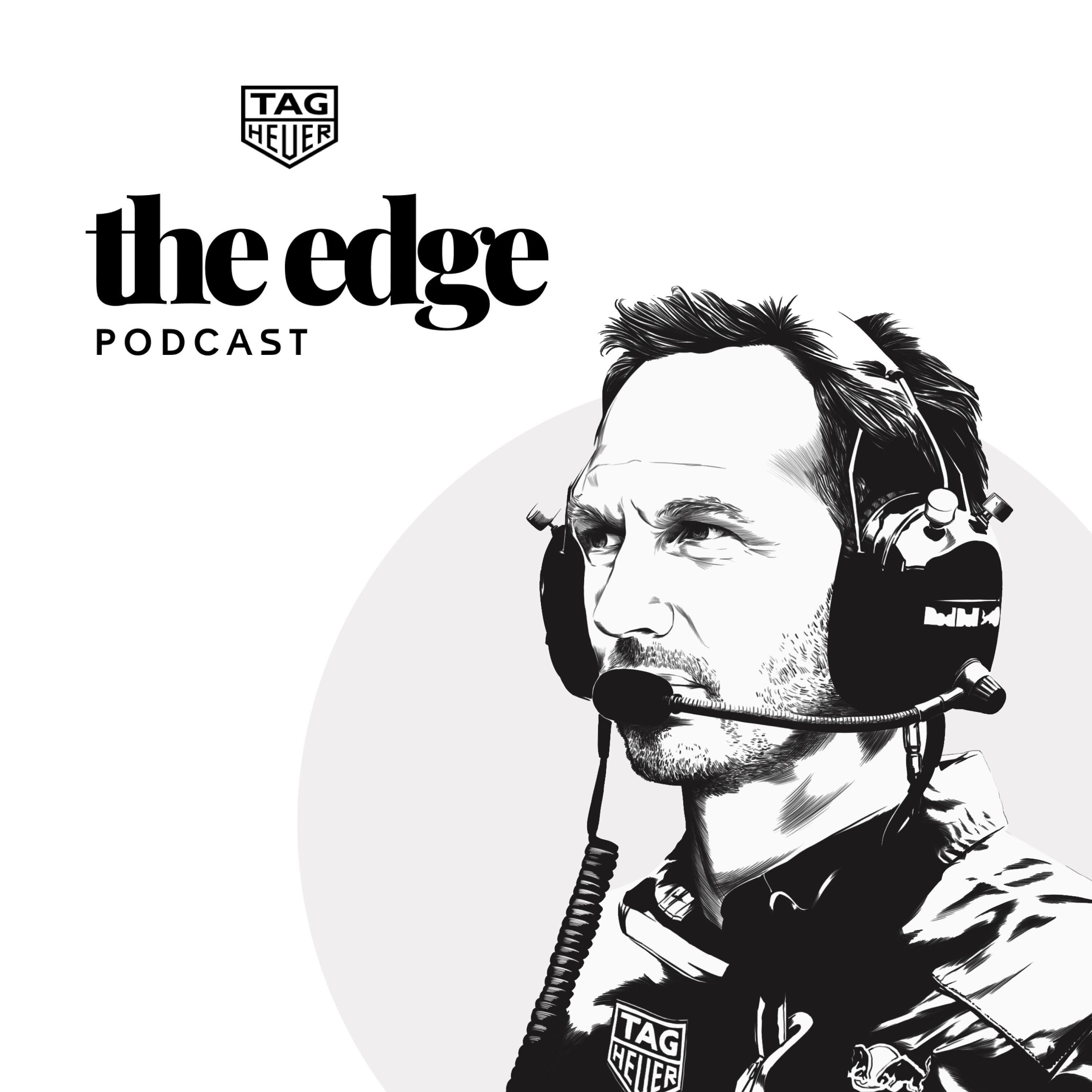Episode Transcript
[00:00:02] Speaker A: Welcome to the Edge, a podcast by Tag Heuer. Our guest this time is tennis star and four time Grand Slam champion, Naomi Osaka. In this episode, Naomi recalls the moment that she won her second Australian Open in 2021. She also talks about the moments that shaped her, how she overcomes pressure, and what the future holds for her both on and off the court.
I'm your host, Naomi Schiff, and this is the Edge, a podcast by Tag Hoy.
Thank you so much for joining us on the podcast today. We get some really fantastic guests on this podcast, but I have to say that you are one of them that I'm most looking forward to speaking to. And I hope none of our other guests feel offended by that. But that's because I find your story so inspiring, and it'll be great for the listeners to be able to hear just a little bit about it. So first and foremost, I'd like to ask you, where are you right now?
[00:01:06] Speaker B: I'm at home right now in Los Angeles.
[00:01:09] Speaker A: Okay, fantastic. Home, home. That's nice. I also just got back home from a long travel, so I can totally appreciate how good it feels to be home. Are you busy doing anything there at the moment, or are you just taking some time off and enjoying being home?
[00:01:24] Speaker B: Um, I'm. I feel like I'm always a bit busy, but right now I would say I'm busy, like, watching over my daughter.
[00:01:33] Speaker A: Now, I want to start from the very beginning. You were obviously born in Japan, but moved to the US From a very young age. So just tell me a little bit about your background and growing up.
[00:01:43] Speaker B: Um, yeah, my background is that I.
I was born in Japan, but I moved to New York when I was around three years old, and my mother's Japanese and my father's Haitian, and we moved to New York and then moved to Florida after that for tennis. When I was around, I want to say, seven or eight. So, yeah, a lot of traveling for tennis.
[00:02:13] Speaker A: Absolutely. So seven years old is very, very young. And most very professional athletes do start their craft at a young age. But I'd love to understand where your love for tennis came from.
[00:02:25] Speaker B: I would say my love for tennis came from watching my role models. I loved, like, when we were younger, we got to go to the US Open and watch the professional athletes. So I would say, yeah, aspiring to be like them started my love for tennis.
[00:02:45] Speaker A: Fantastic. Well, we're obviously going to go into another segment of the podcast which goes into one very specific moment or achievement in your life. So let's fast forward from the tender age of 7 years old, where you pick up your love for tennis to February of 2021 at the Australian Open. Can you remember any significant moments or events that led up to the incredible Australian Open final against Jennifer Brady?
[00:03:13] Speaker B: I have a very specific memory, like walking through the tunnel of Rod Laver and seeing all the names on the wall and wanting my name to be up there for the second time. So I would say that that's probably a very significant memory for me.
[00:03:33] Speaker A: Very ambitious. Not once, but twice. You wanted your name up there. Now you'd obviously just beaten Serena Williams in the semifinal.
I'd love to know, did that have any sort of effect on your mindset when you were heading into the final?
[00:03:47] Speaker B: Yeah, I would definitely say beating Serena gave me. I wouldn't even really say it was confidence, but I felt like I had no choice but to win the final because I wouldn't be doing her justice if I didn't win. I don't know, it's kind of a weird, like, mindset. But, yeah, that's kind of the way that I felt.
[00:04:13] Speaker A: It's such a. I mean, I've attended a lot of different sports and tennis. The one thing that really. I don't know if you know this about me, but I used to be a racing driver, so we're very much on our own, helmet on in the car, you can't hear what the crowd have to say. Whereas in tennis it can be like, so quiet that you could hear a pin drop. But then also you hear a lot of people's opinions and things like that. So when you're in the court and you know that this is a Grand Slam final, how do you prepare yourself for that kind of environment?
[00:04:41] Speaker B: I would say what it's like to prepare for a moment like a Slam final.
For me, I just. I think about all the hours I spent practicing to get there, and it makes me have a lot of appreciation for myself and the opponent and all the, like, the people in the team and everything like that. But I would say when I get on the court, I don't really hear anything, which is really interesting.
And I just. I would say I just focus more on what I set out to do.
[00:05:17] Speaker A: That's so interesting that in a moment like that, you can be so hyper focused, I guess, that you can't really hear anything else that's going on around you.
So can you describe, even though you don't really hear much in the moment, what the atmosphere is like when you get on the court or when you got on that court in February 2021.
[00:05:35] Speaker B: I would say the atmosphere. I usually listen to music during the walk on, but even through the headphones, you can hear a roar when you step on the court.
And it seems like. Well, it feels like people are really excited for a battle.
And, yeah, I think even though I say I can't hear anything, I know if I hit a good shot or if the atmosphere is tense, then I can hear, like the shuffle in the crowd or I can hear clapping in between points and stuff like that.
[00:06:14] Speaker A: Amazing. Now I know that, you know, these moments are things that you train for for a very, very long time. And it's also the culmination of a lot of people's work coming together, whether that's all the hard work and hours that you put in, or your trainer, your coach, your parents, whoever it may be. So is there any memory that you remember during that Grand Slam final where something happened that either spurred you on or maybe on the flip side, held you back?
[00:06:41] Speaker B: Actually, yeah, there was something that kind of spurred me on. I was playing, I think it was my third route match, but I was playing on Stabur, and a butterfly landed on my leg, and then it landed on my face.
And I don't know, I felt like it was kind of a magical moment.
And it just made me want to continue on because some people were saying, like, the butterfly is a spirit that visited me in something like that. So it made me want to keep going.
[00:07:22] Speaker A: Would you consider yourself a superstitious person? I know that a lot of sports people do find little things like that that help them or spur them on or just give them a little bit routine or whatever it may be there might be. You know, like you say you put your headphones on, you have your routine that gives you an edge because you know that you're in your element. Or if something like that happens, that could be a moment of superstition. Would you consider yourself a superstitious person?
[00:07:47] Speaker B: Yeah, I would consider myself a superstitious person. But I try to break out of the superstition sometimes, but then also it depends. But I think definitely during a tournament, I would lean more towards being superstitious than not.
[00:08:06] Speaker A: I totally get it. It must be difficult also, because you don't want to rely on those superstitions. But when they happen, you probably hold on to them for dear life as well. Now I want to take you back to the final. Now you're at championship point. Can you describe what it feels like to be on the edge of such a triumph?
[00:08:24] Speaker B: I would say what it feels like for Me, I always kind of have to go back towards the end of the court and take a couple breaths just to make sure that I'm not too shaky going into that point. But I always try to treat it like another point and not focus too much on what could happen if I win or not.
But yeah, you do feel kind of the weight of the importance.
It feels like the goal is right there and you can touch it, but you have to obviously play a really good ending point to get there. But you don't want to stress yourself out too much. Yeah, a combination of things.
[00:09:13] Speaker A: Yeah, it sounds like what you're describing is a little bit like. It's funny how you say that you want to treat that like every other point because if not, then maybe you put too much pressure on it and psych yourself out more than you even need to because what got you there to begin with was the game you'd already played. But it's about, I guess, mentally keeping yourself grounded in that moment. Right. Okay, well, tell us then about the moment where you won the title. What were the emotions like and how did the people around you react?
[00:09:41] Speaker B: I mean, the emotions were very happy.
I don't know. It was.
That year was the year that we had to quarantine in Australia. So it felt like a much longer trip than normal. And it just, we, me and my team, we felt like we bonded a lot because we kind of only could see each other.
And yeah, it just felt like the perfect ending of a good trip.
[00:10:19] Speaker A: Now, you were the first woman to win the first four Grand Slam finals of your career since Monica Stellas in 1991. Now these sorts of achievements and accolades are huge, but what do they mean to you? Or do you just focus on taking things one day and one game at a time?
[00:10:39] Speaker B: Honestly, I didn't know that, so I guess it's good to hear. But yeah, I would definitely say I'm the type that I appreciate, like those accolades and trophies and making history, but I find myself always looking forward and always looking towards the next goal, which is something that's helped me out a lot. And it's also, I wouldn't say negatively affected me, but I would say sometimes it's good to stop and smell the roses as well.
[00:11:16] Speaker A: Absolutely. Now, I mean, just even continuing a little bit on that thread, you've obviously achieved so many great things and I'm sure that there's going to be so much more silverware to come your way. But there are definitely moments in athletes lives that shape them or something that really defines Your career and maybe even just shifts the way you do things. Would you say that you have a career defining moment that shaped you?
[00:11:40] Speaker B: It's interesting because when I think back on it from like my inner self, I feel like.
I feel like I could, but then I think about the future and how much more I could continue. And there's like such a huge realm of possibilities. But in that sense, if I had a career defining moment, I would have to say it was when people first started, I guess, knowing me, which would have been the first U.S. open that I won.
[00:12:17] Speaker A: And when you say knowing you, do you mean recognizing you or starting when your name started to just get on the map? I mean, it's the recognition part that you're talking about.
[00:12:26] Speaker B: No, it's kind of more. I don't ever really think people know me. It's just more my name. It's like the first name and the last name.
[00:12:35] Speaker A: Yeah. And I mean, that in itself is something that bears a lot of weight, I guess, because up until that moment, before people start recognizing the name or the athlete, you play for yourself and for the basics. But did that bring on an extra level of pressure when people started recognizing your name?
[00:12:55] Speaker B: Yes and no. It was really interesting because my family is quite small. Like, it's just my dad, my sister, my mom and me.
That's kind of what I was used to. And then suddenly there was so many more people that I started to, I guess, interact with. So it was just things like that that made my world much bigger. But I would say in terms of like, dealing with expectations, I think I did pretty well with it until I didn't. I kind of have a tendency to, like, put things off until, like, that bother me, until it like, becomes too much and then things start crumbling. So I would say I've had like, slight moments in my career where you could tell.
And then obviously the. I don't want to call it a debacle, but like the French Open situation, which became way bigger than I thought it was going to be, but yeah, probably there.
[00:14:08] Speaker A: And in terms of, you know, that sort of characteristic that you describe yourself of having of maybe bottling things up a little bit until they boil over. Have you leaned into that more or have you tried to find a way to shift that, that way of coping?
[00:14:25] Speaker B: No, I've definitely changed that after, I guess, having my daughter being pregnant and just like taking a year off of playing tennis and.
I don't know. I think the biggest thing was being pregnant and realizing that you can't do everything by yourself. And then that kind of shifted into me thinking, wow, actually, like, I don't even have to be pregnant to ask for help.
So that, that helped me a lot.
[00:15:00] Speaker A: We're going to come back onto that in a little bit, but before we go there, I just want to go back to your story as a person because there's so much to uncover and there's so much to you. And as you say, not a lot of people know you for you because you've got to protect yourself at some points as well. But every athlete has a sort of origin story and a key moment that makes them who they are. Do you have one of those?
[00:15:24] Speaker B: Yeah, I would say I think I'm pretty much a younger sister that got beat by their older sister all the time. And for me, my biggest goal in tennis was to beat my older sister.
And I don't know, I never really thought all of this could come from that, but that was my starting out achievement.
[00:15:53] Speaker A: A healthy relationship with two sisters. I mean, your sister, from everything I've seen, seems to be one of your best friends. If not your best friend.
How does she support you today? What is it like for her to see you thriving and shining in the space where she used to beat you all the time?
[00:16:11] Speaker B: Yeah, she.
I don't know, it's kind of weird thinking about it like that, but she's always been really kind and supportive and she's just really talented in so many different things that I think, like, it's kind of. I don't know how to describe it, but like, for me, I've always felt like she's good at everything and I'm potentially only good at tennis. So I held onto this one thing because it was the only thing I could beat her at. And since she's the older sister, she's.
She's nicer and she puts up with the annoying younger sister. So that's the type of relationship we have.
[00:16:57] Speaker A: I very, very highly doubt that the only thing that you're good at is tennis, but it's great to hear that your sister's so talented at so many things and maybe one day you'll beat her at one of those things again. But I guess for now, when you have to put so much of your focus into tennis and motherhood, there's not a lot of time to focus on other things. But I can guarantee you that if you put your mind to something else, you would be great at it as well. Now, from your perspective, what would you say it takes to be an elite athlete?
[00:17:24] Speaker B: Oh, a lot of dedication. I think people don't realize the amount of hours that go into it. And even if they realize the hours that go into it, they don't know that.
I don't know. You have to have so much resilience. You have to have so much determination. It's not an easy thing to do. And then, even if. Even if you get to the level that you think is a professional athlete, there's so many other people trying to do the same thing as you. So it's kind of a battle of will at that point.
[00:18:04] Speaker A: Mm, absolutely. It's. I mean, this is exactly why I'm saying that I'm pretty sure that you would be good at something else, because the dedication, sacrifice, willpower, mental strength, all of the things that it takes to be an elite athlete, I think you need a fraction of them to be good at half of the other things that there are out there. So I just want to know, from your perspective, you've obviously been a champion when it comes to speaking of art, social issues like mental health.
What is it that inspires you to keep raising awareness about these important subjects?
[00:18:40] Speaker B: I would say what inspires me to keep raising awareness?
I think just realizing that if your voice can reach just one person, then that's good enough. And I happen to have the reach of more than one person, and I didn't realize that until a little bit later in my career.
But, yeah, I think just trying to speak on what matters to you and what's authentic and the issues that you think need to be brought are light.
[00:19:22] Speaker A: Sure.
I think sometimes athletes are under so much pressure because I think sometimes people forget that you don't have to do those things. You are there to play the game or do your job, just like anybody else who shows up to their job. You don't have to do that and go out there and be an inspiring person who uses their platforms or their platform in the right way. But you do choose to do that. And I guess, as you say, it's because it's an authentic subject to you, But I think you were quoted saying that letting go of your words sometimes is helpful, or your words and your concerns. I think the quote was, it's like speaking your words into the universe and letting them go. And after you do, you're kind of just free from the thoughts that mull at your mind.
Can you tell us a little bit more about that and how it helps you on the course?
[00:20:14] Speaker B: Sure. I would say I'm a bit of a chronic notes app user. And also, just like pages I love writing, and I love journaling, and I feel like it's kind of an archive of where my mind was or how I was thinking prior. And I would say it helps me on the court because I do think of things.
If I have a. Like, if I have something that's troubling me, I do sometimes think about it on the court. So I would say writing it down or getting my thoughts on paper helps me out a lot while I'm practicing or while I'm playing tournaments.
[00:21:03] Speaker A: That makes a lot of sense. Get your thoughts onto paper. Let it all out now. I mean, I'm sure there's been a lot of lessons along the way, but is there anything that, during your career, you never expected to learn that you did?
[00:21:17] Speaker B: I would say I was fortunate enough to, I guess, have Kobe be kind of my mentor, and I received advice from him that was really helpful in the moment, and it was like, dealing with, I guess, outside opinions and stuff like that. It was when I was a little bit younger than I am now. But, yeah, I would say probably that.
[00:21:47] Speaker A: And if we may pry into what some of that might have been, because I know it's probably a lot of personal. Personal conversations, but what were some of the words of wisdom that he gave you in those moments that helped you?
[00:22:01] Speaker B: He was like. He was telling me to refer to myself as a lion. And outside opinions and stuff are like the flies around the lion's eyes. And to know that the lion just always stares straight ahead, stuff like that. Very coded.
[00:22:21] Speaker A: Smart. Very smart, though. I mean, visualization is a powerful tool, and even that in that moment, I think I'm going to try to do that now. When people upset me, I'm the lion, you're the flies. Keep it pushing now.
You've achieved a lot. I've said that already. But is there anything in your career, in your life, whatever it may be, that you still dream to achieve?
[00:22:44] Speaker B: Yeah, I mean, I think dreams are kind of what make a person. And I have really big dreams, and I think, you know, I don't know. I still wish to achieve a lot on and off the court.
I want to win more Grand Slams. I want to win the Slams that I haven't won, which is Wimbledon and French Open. And I think this year showed me that I can play really well on clay. So I'm really excited to go back next year.
And then the next Olympics are also coming up soon, so I don't know. I feel like there's so much to look forward to.
[00:23:29] Speaker A: Absolutely. And the next Olympics is Just around the corner for you, I presume, seeing as it will be in Los Angeles, it'll be amazing to see what that's going to look like first and foremost, and hopefully we'll get to see you be there. Do you have any advice for future tennis stars?
[00:23:45] Speaker B: I would probably say there's going to be tough moments and there's going to be really happy moments. But all in all, you shouldn't let moments define you as a person. And in the game of tennis, you should know that it is a game, so you need to have fun and.
Yeah. Work hard, play hard, I guess.
[00:24:10] Speaker A: Fantastic. I think that that's really, really great advice. Now, I want to shift a little bit to motherhood.
I'm not a mother yet, but I can only stand here and say that I'm in admiration of the fact that you are able to juggle being a mother and being an elite athlete. So can you just explain how on earth you do that?
[00:24:32] Speaker B: Oh, I'm not really sure, to be honest.
I think it's something like I'm kind of adapting every day to, because, you know, she's an. She's another person, so she's not the same every day. But, yeah, I would say I realize the importance of every minute and I value all the time that we spend together and all the time that I'm away from her, I hope turns into something. But, yeah, I just think.
I think we're kind of going on a journey together, and I'll see where that leads us.
[00:25:19] Speaker A: Would you say that motherhood. Well, that's a silly question because I'm 100% sure that it has, but I was going to say, has it changed you? Of course it has. But in what ways would you say motherhood has positively impacted who you are as a person, but also who you are as an athlete?
[00:25:38] Speaker B: I do think motherhood has changed me as an athlete and also as a person, but I wouldn't be able to pinpoint those specific characteristics to you. I think maybe someone close to me would be able to.
I know on the court it's made me a lot more, I would say, decisive. And also I think my. I've always thought my pain tolerance was high, but I would say after giving birth, I don't think any workout would ever faze me.
But, yeah, I don't really know too much off the court. I think it's made me a lot more confident in myself.
[00:26:22] Speaker A: Now, you put out a post very recently, a few days ago, I would say, about the pressures and expectations when being a mother. And the overwhelming urge to have to snap back.
Can you tell us what mind frame you were in when you decided to post this? And also, you know, what inspired that moment of gratitude and the message you wanted to put out there but also give to yourself?
[00:26:45] Speaker B: Yeah, I would say it was.
It was me kind of writing a letter to all the moms. And I don't know, I've been fortunate enough to interact with so many different moms on my journey this year, and they've all been so kind, and they've all told me that I'm an inspiration to them, but I feel like they're an inspiration to me. And I just.
I don't know, I just feel like in society, we're kind of expected to, I guess, give birth and immediately kind of look the exact same way that we did before. And I realized, like, I wasn't happy in my body, I guess some days after giving birth, or not even days, I would say months. And I was always, like, feeling a little bit of shame because I thought as an athlete, like, I should immediately look back the way that I did because I'm burning so many calories and things like that. So I would say that that post was an appreciation to moms and also an appreciation to my body, because it's gotten me so far. And I was just very grateful, as you should be.
[00:28:06] Speaker A: I think we're all men, women, but particularly women, very critical of ourselves. And I think in a world where we have so many examples, not all real, some of them very edited out there to constantly look at and compare to, it's very difficult to be nice to yourself. And, yeah, our bodies get us so far. And body morphology is also something that people don't talk about a lot. But we aren't all made the same way, and we don't all react the same way to certain things. So I think that was a powerful message, and I think it was one that, firstly, you absolutely deserve to give to yourself, but I think is inspiring for other people to see as well that if someone like you, who is an athlete who is training super hard and isn't bouncing back at the rate you expect it to, then it's okay for everybody else out there to not have to put that pressure on themselves either. So good on you for putting that message out. Now, this podcast is obviously called the Edge. So every guest that comes on here has to answer this question to me at the end of the podcast. And the question is, what does the Edge mean to you?
[00:29:08] Speaker B: Oh, I think my immediate thought is the Edge of a cliff, like someone standing at the edge of the cliff and sort of looking out over water.
That's my immediate thought. But then if I was thinking deeper, I would say the edge means to me pushing the line or the boundary.
And for me, when I think about the edge as an athlete, I would say you're kind of always grasping to get to the edge, whether it's like you're doing a workout and you're trying to get that last burn. And that's kind of the edge.
[00:29:58] Speaker A: I love that. It's true. Everyone who answers it has a slightly different version, but all of them are very accurate and we all can understand what you mean in that moment. So thank you for giving us your version of the Edge. Well, Naomi, thank you so much. Just as I said at the top of the podcast, this was a conversation that I was really looking forward to have and it was very worth it. You are such an inspiration and I can't wait to keep watching you do what you do best. Thank you so much for joining us today.
[00:30:26] Speaker B: Thank you. It was great talking to you.
[00:30:34] Speaker A: Thank you for listening to this episode of the Edge. If you'd like to listen to more episodes like this one, then check out our interviews with Petrak Kvitova and Felix Auger Aliasim. If you enjoyed this episode, then don't forget to subscribe and leave us a review. It really does make a difference. But before we go, I'd like to say another big thank you to Naomi for joining us on this episode. And as always, I'm your host, Naomi Schiff, and I'll be back for another episode of the Edge, a podcast by Tag Heuer.
[00:31:02] Speaker B: See you soon.
